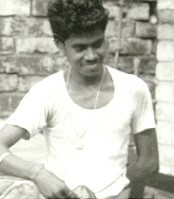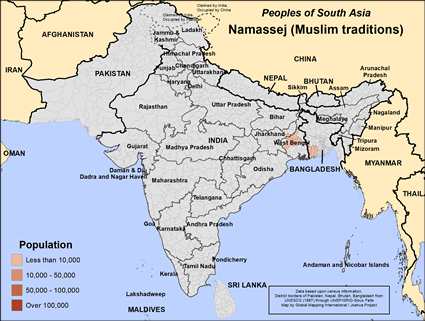Namassej (Muslim traditions) in Bangladesh

Photo Source:
Copyrighted © 2026
India Missions Association All rights reserved. Used with permission |

Map Source:
People Group data: Omid. Map geography: UNESCO / GMI. Map Design: Joshua Project
|
| People Name: | Namassej (Muslim traditions) |
| Country: | Bangladesh |
| 10/40 Window: | Yes |
| Population: | 2,300 |
| World Population: | 4,900 |
| Primary Language: | Bengali |
| Primary Religion: | Islam |
| Christian Adherents: | 0.00 % |
| Evangelicals: | 0.00 % |
| Scripture: | Complete Bible |
| Ministry Resources: | Yes |
| Jesus Film: | Yes |
| Audio Recordings: | Yes |
| People Cluster: | South Asia Muslim - other |
| Affinity Bloc: | South Asian Peoples |
| Progress Level: |
|
Introduction / History
At one time the Namassej were called Chandal, which is a derisive term. They were outcastes, meaning they were below all communities in the Hindu pecking order. Being outcasts, they had nothing to lose from joining reform movements. In 1891 they officially changed their name to Namassej, or Namasudra. Some have converted to Islam, a religion which rejects caste. However, even the Muslim community is affected by caste in South Asia, and Namassej individuals often have conflicts with Muslim landowners.
There are roughly an equal number of Muslim Namassej people in Bangladesh and West Bengal, India. They live in the Bengali-speaking regions and speak Bengali. Traditionally they were fishermen and boatmen when their homeland was marshy. Since that time, the land has been reclaimed for agricultural purposes.
What Are Their Lives Like?
Today members of the Namassej community, be they Hindu or Muslim, are most likely to be farmers. They continue their efforts to find justice and equality.
What Are Their Beliefs?
These people are Sunni Muslims who believe that the supreme God, Allah, spoke through his prophet, Mohammed, and taught mankind how to live a righteous life through the Koran and the Hadith. To live a righteous life, you must utter the Shahada (a statement of faith), pray five times a day facing Mecca, fast from sunup to sundown during the month of Ramadan, give alms to the poor, and make a pilgrimage to Mecca if you have the means. Muslims are prohibited from drinking alcohol, eating pork, gambling, stealing, slandering, and making idols. They gather for corporate prayer on Friday afternoons at a mosque, their place of worship.
The two main holidays for Sunni Muslims are Eid al Fitr, the breaking of the monthly fast and Eid al Adha, the celebration of Abraham's willingness to sacrifice his son to Allah.
Sunni religious practices are staid and simple. They believe Allah has pre-determined our fates; they minimize free will.
In most of the Muslim world, common people depend on the spirit world for their daily needs since they regard Allah as too distant. Allah may determine their eternal salvation, but the spirits determine how well they live on a daily basis. For that reason, some Muslims appease spirits using charms and amulets to help them with spiritual forces. More orthodox Muslims consider these practices heretical and un-Islamic.
What Are Their Needs?
The Namassej people need to be given the chance to hear the life-changing gospel so they can enjoy life to the full.
Prayer Points
Pray for loving gospel workers to catch a vision for reaching the Namassej people for Jesus and that in God's sovereign timing the hearts of these people would be open and ready to follow him.
Pray for Jesus movements to bless extended families so the gospel will spread rapidly.
Pray for the spiritual lives of the Namassej people to become fruitful so others will be drawn to Jesus Christ.